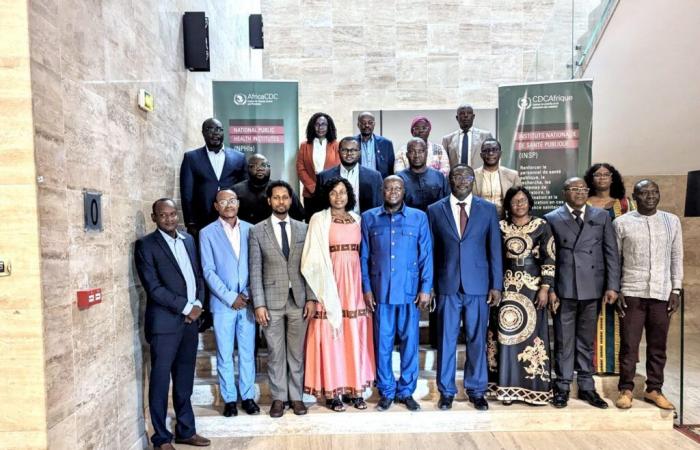N’Djamena, September 17, 2024 – The Africa Centers for Disease Control and Prevention (Africa CDC) organized a regional meeting of directors of national public health institutes (NPHIs) and technical experts from ministries of health in Central Africa from September 16 to 17, 2024. The objective of this meeting was to continue advocacy for NPHIs and take stock of progress in the creation and strengthening of NPHIs, one year after the regional meeting held in Burundi in 2023.
Fully functional national public health institutes play a crucial role in detecting and responding quickly and effectively to health threats and emergencies. In line with its priorities outlined in the New Public Health Order for Africa and its Strategic Plan 2023-2027, Africa CDC has made the establishment and strengthening of national public health institutes a priority pillar to strengthen health systems in Africa.
For several years, Africa CDC has been providing its expertise to Member States for the creation of national public health institutes and this within the framework of the strengthening of the health security of the continent and the consolidation of the main assets in terms of of public health”, said the Director General of Health of the Chadian Ministry of Public Health, Dr Yam-madji Aliace Djitaingar. “To achieve this objective, support technical and financial support to Member States at different stages of INSP development have helped to strengthen the institutions already in place.”
At the Bujumbura meeting in July 2023, an action plan to accelerate the development of national public health institutes in the Central African region was adopted. Member States committed, among other things, to finalizing draft laws and legal frameworks for the institutionalization of NPHIs, developing annual plans to mobilize resources, and strengthening collaboration between different sectors within the framework of a “One Health” approach, while Africa CDC committed to increasing advocacy with African Union Heads of State and Government, improving regional collaboration, and organizing peer-to-peer exchanges or experience sharing between institutions. Chad, São Tomé and Príncipe, the Democratic Republic of Congo (DRC), and the Central African Republic (CAR) have already benefited from these exchanges.
“Africa, and our region in particular, is facing many health challenges and an increase in the number of public health events, as evidenced by the ongoing Mpox outbreak in 15 countries in Africa and declared a continental security public health emergency by Africa CDC on August 13, 2024. These recurring health crises on our continent demand that we accelerate our efforts,” said Dr. Brice W. Bicaba, Director of the Africa CDC Central Africa Regional Coordination Center. “Effective National Public Health Institutes act as scientific hubs to promote disease prevention and infectious disease surveillance to ensure the health security of our populations.”
In February 2018, Africa CDC organized its first meeting of national public health institutes to promote collaboration, coordination and exchanges between NPHIs and partner organizations. In the Central African region in 2018, only the Republic of Burundi had a national public health institute. In October 2023, thanks to Africa CDC’s multifaceted support, the Democratic Republic of Congo and Chad have established their NPHIs. In addition, two countries, namely: Cameroon and the Central African Republic, are in the process of establishing their NPHIs.






